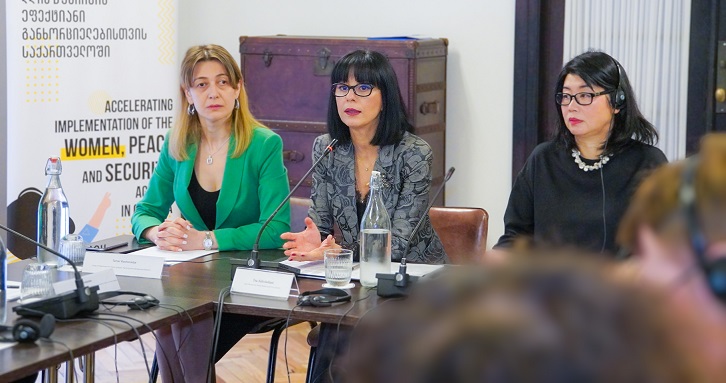Georgian officials, civil groups, Int’l organisations discuss occupation at information meeting

Thea Akhvlediani, the State Minister for Reconciliation and Civil Equality, highlighted the importance of “active involvement” of women and youth in peacebuilding in her comments opening the event. Photo: Reconciliation Ministry press office
Georgian officials, members of domestic civil society groups and international organisations on Tuesday discussed the Russian occupation of two of the country’s regions and related issues at an information meeting hosted by the office of the Georgian State Ministry for Reconciliation and Civil Equality with the support of the United Nations Women organisation.
The event also featured participants of the Incident Prevention and Response Mechanism - a platform facilitating talks between the Georgian Government and de-facto authorities in the occupied Abkhazia and Tskhinvali (South Ossetia) regions, with Thea Akhvlediani, the State Minister for Reconciliation and Civil Equality, highlighting the importance of “active involvement” of women and youth in peacebuilding in her comments opening the event.
Noting the killing of Georgian citizen Tamaz Ginturi by Russian-controlled occupation forces earlier this month, the official stressed the incident had “clearly demonstrated” the “severe consequences” of the ongoing occupation of Georgian territories.
She also urged the country’s international partners to ensure further efforts for the release of citizens illegally detained in the occupied regions, and punishment of those convicted for killing of the country’s nationals in the regions over the years.
Akhvlediani also highlighted the importance of the IPRM mechanism, which aims at finding solutions to security, human rights and humanitarian issues for conflict-affected communities on both sides of the administrative boundary lines separating the two regions from the rest of Georgia.
She noted the “restoration of trust and mutual respect” between the conflict-affected communities, and creation of “decent living conditions” for them remained the Government's “key priority” before peaceful reintegration of the regions.
UN Women representatives and participants of the IPRM also discussed challenges facing the communities, ways to resolve them, and the work of specific mechanisms.
 Tweet
Tweet  Share
Share